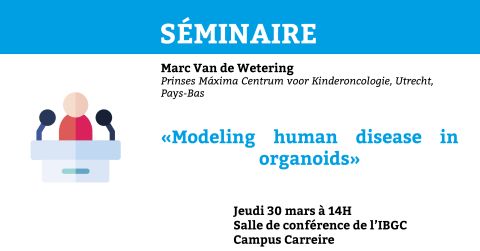"Modeling human disease in organoids"
Marc Van De Wetering is senior scientist at the Princess Maxima Center for Pediatric Oncology. He did his PhD study in the lab of Hans Clevers where he studied T-Cell development. During his PhD study he reported the cloning of a T-cell specific transcription factor that he termed TCF1 (van de Wetering et al., EMBO J. 1991). Related genes exist in genomes throughout the animal kingdom. After obtaining his PhD, he continued to work in the Clevers lab. He has shown in frogs (Molenaar et al., Cell 1996) and Drosophila (van de Wetering et al., Cell 1997) that the TCF proteins constitute the effectors of the canonical Wnt pathway. Upon Wnt signaling, ß- catenin binds and activates nuclear TCFs by providing a trans-activation domain. For these studies, he designed the widely used pTOPFLASH Wnt reporters.
The WNT pathway is the driving force for the self-renewal of the intestinal epithelium but aberrantly activated it becomes the dominant driver of colorectal cancer. He showed that the TCF4-driven target gene program in colorectal cancer cells is the malignant counterpart of a physiological gene program in self-renewing crypts (van de Wetering et al., Cell 2002). The analysis of the genetic program subsequently led to the identification of the stem cells of the intestine. He was involved in the development of the organoid culture system that allows the outgrowth of single mouse or human intestinal stem cells into ever-expanding mini-guts (Sato et al., Nature 2009). Using this technology, he reported the first “living” cancer organoid biobank (van de Wetering et al., Cell 2015). He currently is acting group leader for the Clevers-pediatric cancer organoid group at The Princess Maxima Center where he uses organoid technology to develop novel in-vitro models to study childhood cancer.
van de Wetering, M., Oosterwegel, M., Dooijes, D., and Clevers, H.C. Identification and cloning of TCF-1, a T cell-specific transcription factor containing a sequence-specific HMG box.
EMBO J. 10:123-132 (1991)
Molenaar, M., Van de Wetering, M., Oosterwegel, M., Peterson-Maduro, J., Godsave, S., Korinek, V., Roose, J., Destrée, O. And Clevers, H. Xtcf-3 Transcription factor mediates beta-catenin-induced axis formation in xenopus embryos.
Cell 86: 391-399 (1996)
van de Wetering, M., Cavallo, R., Dooijes, D., van Beest, M., van Es, J., Loureiro, J., Ypma, A., Hursh, D., Jones, T., Bejsovec, A., Peifer, M., Mortin, M., and Clevers, H. Armadillo co-activates transcription driven by the product of the Drosophila segment polarity gene dTCF.
Cell 88, 789-799 (1997)
van de Wetering, M., Sancho, E., Verweij, C., de Lau, W., Oving, I., Hurlstone, A., van der Horn, K., Batlle, E., Coudreuse, D., Haramis, A-P., Tjon-Pon-Fong, M., Moerer, P., van den Born, M., Soete, G., Pals, S., Eilers, M., Medema, R., Clevers, H. The beta catenin/TCF4 complex imposes a crypt progenitor phenotype on colorectal cancer cells.
Cell 111: 241-250 (2002)
Sato, T., Vries, R., Snippert, H., van de Wetering, M., Barker, N., Stange, D., van Es, J., Abo, A., Kujala, P., Peters, P., and Clevers, H. Single lgr5 gut stem cells build crypt-villus structures in vitro without a stromal niche.
Nature 459 :262-265 (2009)
van de Wetering, M., Francies, H.E., Francis, J.M., Bounova, G., Iorio, F., Pronk, A., van Houdt, W., van Gorp, J., Taylor-Weiner, A., Kester, L., McLaren-Douglas, A., Blokker, J., Jaksani, S., Bartfeld, S., Volckman, R., van Sluis, P., Li, V.S.W., Seepo, S., Sekhar Pedamallu, C., Cibulskis, C., Carter, S.L., McKenna, A., Lawrence, M.S., Lichtenstein, L., Stewart, C., Koster, J., Versteeg, R., van Oudenaarden, A., Saez-Rodriguez, J., Vries, R.G.J., Getz, G., Wessels, L., Stratton, M.R., McDermott, U., Meyerson, M., Garnett, M.J., Clevers, H. Prospective derivation of a 'Living Organoid Biobank' of colorectal cancer patients.
Cell 161: 933-945 (2015)
Vous souhaitez participer à une discussion individuelle avec Marc Van De Wetering ? Merci de contacter Damien Coudreuse.


